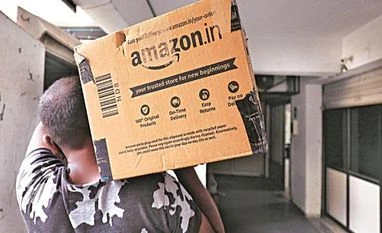Amazon Retail India on Tuesday said it has entered Gujarat to source directly from farmers and launched a collection centre in Prantij, a town in Sabarkantha district.
The e-commerce major said the aim is to empower the farmers of Gujarat and offer high-quality fruits and vegetables to its customers.
The firm said that this collection centre will pave the way for fast payments, fair and transparent pricing as well as guidance on farming.
Rajesh Prasad, category leader, Amazon Retail India, said the centre will meet the demands of neighbouring Delhi-NCR, Mumbai and Pune.
“Gujarat has progressive farmers and our mission is to enable them to leverage online marketplaces and become a part of the digital economy,” said Prasad.
He added, “With this launch and expansion of our collection centre network, we are positioned to procure fresh and the best quality local produce and deliver it to our customers.”
Apart from this, Amazon Fresh already has seven collection centres across India — four in Maharashtra, one each in Haryana, Rajasthan, and Himachal Pradesh.
Amazon Retail is working with thousands of farmers as it is scaling up its infrastructure and supply-chain network across the country. The endeavour is to source as much locally as possible.
“We are also working with farmer producer organisations (FPOs) in Gujarat and have already registered over 120 farmers for selling their produce at the collection centre,” said Prasad.
“As we grow, we continue to learn more about farmers and the supply chain. And, we are working towards building the infrastructure and state-of-the-art technology. This will help simplify the end-to-end value chain from our farms to customers.”
The Prantij collection centre has a temperature-controlled supply chain infrastructure. Amazon said this provides locally-grown fresh fruits, leafies and vegetables.
After sourcing the produce from farmers, Amazon Retail India uses technology at its collection centre to inspect the quality of fruits and vegetables. Thereafter, it continuously monitors the items at multiple stages.
The fruits and vegetables are then sent to the processing centres where they are sorted, graded, geo-tagged and packaged in different sizes.
“The department of horticulture will support Amazon in bringing organic farmers to the collection centre and enabling them to produce better quality fruits and vegetables,” said Dinesh Patel, deputy director of horticulture of the Gujarat government.
Amazon is making progress with its single-grocery store called Fresh and has expanded to more than 20 cities.
Amazon competes with other e-commerce firms such as Walmart-owned Flipkart, Reliance’s JioMart and the Tata group for a share of the grocery and food market.
This segment is expected to become a $790-billion market by 2024 from $603 billion in 2019, according to analysts.
The demand is not just in the metros, but the market is shifting towards organised channels, as e-grocery finds acceptance in smaller cities and towns.
Unlock 30+ premium stories daily hand-picked by our editors, across devices on browser and app.
Pick your 5 favourite companies, get a daily email with all news updates on them.
Full access to our intuitive epaper - clip, save, share articles from any device; newspaper archives from 2006.
Preferential invites to Business Standard events.
Curated newsletters on markets, personal finance, policy & politics, start-ups, technology, and more.
)